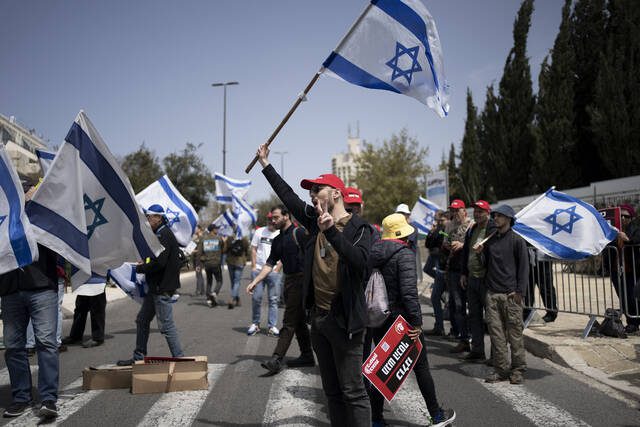TEL AVIV, Israel — Israel's Supreme Court has commanded the government to stop giving financial aid to many very religious men who do not join the army. This is a major ruling that could have big effects on the government and the tens of thousands of religious men who refuse to take part in military service.
Prime Minister Benjamin Netanyahu is facing a serious challenge to his government as he tries to bridge a big divide over military service in the unsteady national unity government created after Hamas' Oct. 7 attack.
In his coalition, the powerful group of very religious parties, who have been partners of Netanyahu for a long time, want exemptions from the military. The moderate members of his War Cabinet, both former military leaders, have said that everyone in Israeli society should contribute equally during the war against Hamas militants in the Gaza Strip.
If the very religious parties leave the government, the country would have to have new elections, with Netanyahu behind in the polls during the war.
Most Jewish men must serve almost three years in the military, followed by years of reserve duty. Jewish women serve two mandatory years.
But the politically powerful very religious, who make up about 13% of Israeli society, have normally been excused while studying full time in religious schools.
The exemptions, along with government payments many school students get until age 26, have angered much of the public. These long-standing tensions have increased during nearly six months of war, in which over 500 Israeli soldiers have been killed.
The Supreme Court has said the current system is unfair and has given the government until Monday to come up with a new plan and until June 30 to pass it. Netanyahu on Thursday asked the court for a 30-day extension to find a compromise.
The court did not right away respond to his request. But it has made a temporary order stopping the government from giving monthly aid to religious students between 18 and 26 who have not gotten a deferral from the military in the past year. Government funds will be stopped starting April 1.
The ruling will affect about a third of the 180,000 school students who get aid from the government for full-time learning, according to Israel's Channel 12 TV. The channel said the aid could be temporarily paid for by the governing coalition's discretionary funds.
Benny Gantz, Netanyahu's main political opponent and a member of the three-man War Cabinet, praised the court's decision and said it recognized “the need for soldiers during a difficult war, and the need for everyone in our society to take part in the right to serve the country.”
Among Israel's Jewish majority, mandatory military service is mainly seen as a way to bring people together and as a traditional experience, and the army has said it is having trouble finding enough people because of the war in Gaza.
The very religious say that joining the army would put their old-fashioned way of life at risk and that their strong commitment to following the Jewish commandments helps Israel as much as a powerful army. Religious leaders have promised to oppose attempts to force very religious men into the army and have organized large protests against similar attempts in the past.
Aryeh Deri, leader of the Shas party for ultra-Orthodox Jews, criticized the court’s decision as an extreme form of bullying against Torah students in Israel.
Netanyahu, in his letter to the Supreme Court asking for the extension, said more time is necessary to reach an agreement because past experience shows that forcing enlistment without a mutual arrangement has the opposite effect.



